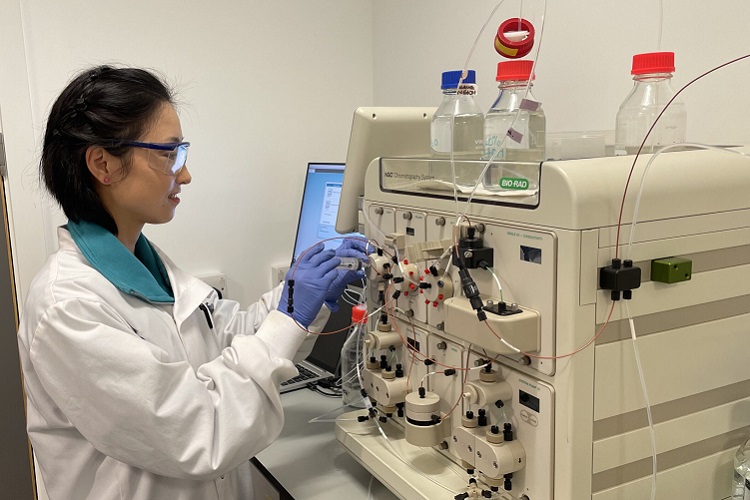St Andrews scientists discover new molecule that combats viral infection in bacteria

A PhD researcher at the University of St Andrews studying microbes in the human gut has discovered a new molecule that acts as a ‘distress signal’ when viruses are detected.
The discovery paves the way to a new class of bioactive molecules that could lead to drugs with applications in human health and antimicrobial therapy.
The community of microbes that inhabit the human body is known as the ‘microbiome’. The health of the microbiome is crucial to our own wellbeing. Just like us, microbes are often infected by viruses and just like us they have immune systems to prevent viruses running amok in the population.
Haotian Chi, from the School of Biology, discovered new molecule SAM-AMP, previously unknown to science, which is made by joining two of the most widespread chemicals present in all living things, SAM and ATP, in a completely new way.
Once made, SAM-AMP causes pores in the cell surface to open, making cells leaky. This can lead to ‘altruistic suicide’ of infected cells to protect neighbours from infection – a type of defence also seen in human cells.
Haotian Chi identified SAM-AMP while trying to understand how the cells’ defence system worked. As it was new to science, this involved a lot of perseverance and detective work using a technique known as mass spectrometry to break the molecule into tiny pieces and then identifying all the parts.
She said: “The existence of SAM-AMP was completely unexpected, showing us there is much we still don’t understand about bacterial immune systems.”
Professor Malcolm White, who led the research, said: “As viruses are constantly infecting bacteria, SAM-AMP is being made in all of us, every day. It will be fascinating to explore how it affects bacteria and whether our own cells can sense this distress signal too. Now that we know how to make this molecule, we can manipulate the component parts to generate a whole family of novel compounds with potential applications in biomedicine.”
Issued by the University of St Andrews Communications Office.
The paper Antiviral type III CRISPR signalling via conjugation of ATP and SAM is published in the leading academic journal Nature.
Please quote the paper’s DOI [doi.org/10.1038/s41586-023-06620-5] in all social media posts.